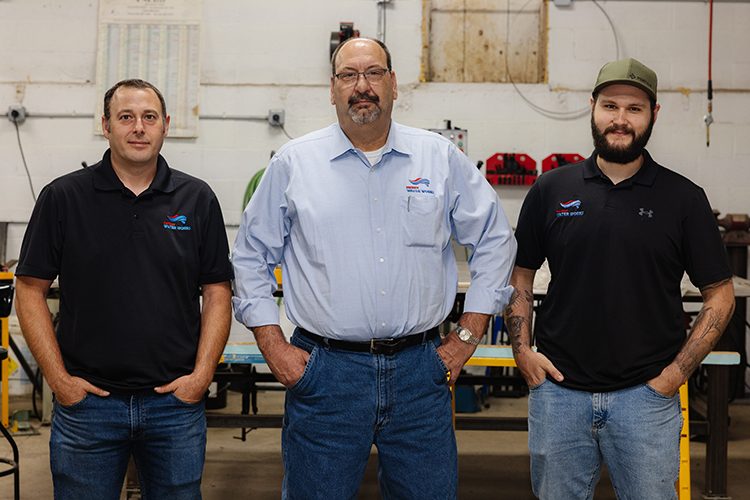Family Businesses: Bringing in the Next Generation
Ensure a smooth transition by fostering open communication, trusting in their abilities and allowing them to take on responsibilities.

As a mechanical company owner, I’m not unique. Like many of my peers, I have worked hard and am increasingly aware of the need to plan for my company’s future and my role within it as I approach retirement.
Those of us in this position have a few options to consider for our exit strategy. We can sell the firm to an individual or a larger firm, our employees or our children, if they’re in the business.
Fortunately, I have two sons eager to take over the company, Patriot Water Works Co. I plan to give it to them, with the understanding that it will support me for as long as we’re around. I will always remain involved in some consulting and management capacity because I genuinely enjoy the work.
The Next Generation
Richard Zalepa, my eldest son, is currently Patriot’s service manager. I adopted him when I married his mother, and he’s been my son in every way since he was eight. We moved from New York to Pennsylvania 20 years ago, and Richard joined us five years later as a grown man.
Richard was part of the company from the beginning, but maturity issues — on his side and mine — led him to work for a competitor. While this was difficult for me, it turned out to be the best move he could have made. After a few years, we needed another sharp technician, and I approached him about coming back. Since then, our relationship has grown even stronger. We work very well together and he’s my right-hand man.
Thomas, my younger son, always butted heads with me because we’re wired the same way. He never wanted to follow me into the trade. He pursued a career as a diesel technician, making good money but finding little room for advancement. After a significant moment of maturity during a breakfast where he picked up the tab, Thomas joined the company as an install technician about a year ago.
In practical terms, Richard and Thomas are the second generation in the company. In reality, Richard is the second generation and Thomas is the third. This is simply due to the disparity in their ages, mindsets and experience levels.
I’m involved in almost every aspect of the company, even filling in for field staff when necessary. Over the next five years, I aim to transition into a sales, support and consulting role. During this period, Richard will take on more of my responsibilities and Thomas will continue gaining experience to eventually assume Richard’s current role. However, expansion of the company will determine exactly how that looks.
As we grow, I see two distinct divisions emerging: Richard will handle the mechanical side of the business, while Thomas, when ready, will focus on water management and leak detection.
My biggest issue with Richard is that I must force him to go home and live life. He’s involved and wants to take the company to the next level; however, he gets tunnel vision as a result.
Thomas is very mechanical, so he’s learning at a staggering pace. He always says he doesn’t want to deal with customers, yet the other day, he had a 20-minute conversation with a customer about the solution we were providing. I stood by and listened, blown away by how much he’s picked up in so short a time.
I can’t express how proud I am as a father. I’m letting the boys take full responsibility. I let them trip a little bit; not fall, mind you, but they need to struggle. Both think critically about things, collaborate and create processes. I don’t offer advice unless they ask for it.
There might be five ways to arrive at the correct solution, and they don’t necessarily need to arrive at the goal by the same path I’d take. This realization on my part has changed my relationship with them.
The Importance Of Communication
I’ve seen other business owners struggle with generational transitions. Each owner and their children are unique, but one universal truth is the importance of communication. I maintain open lines of communication with Richard, Thomas and all my employees. This is especially important when multiple family members are in the business.
Richard is ambitious about expanding the firm, aiming to double our gross revenue in the next five years — a lofty but achievable goal. At this stage, I’m the rudder, Richard is the captain and Thomas is the first mate.
Upon my retirement, Richard will own 51 percent of the company and Thomas will own 49 percent. At the end of the day, someone must have the final say. This structure ensures a clear decision-making hierarchy, which both sons agree is the best way to handle our transition.
Let Them Grow
If your children grew up in your household, they’ve learned more from you than you realize. You’ve taught them how to be good people and instilled a strong work ethic — qualities learned by example.
If you trust them, the best approach is to let your children develop their skills and solve problems, even if they do it differently than you would. This philosophy applies to all my employees, not only my sons. In fact, I hold Richard and Thomas to higher standards than anyone else in the company.
Allow your children to grow into their roles, make mistakes and learn to handle people and problems. This is the best way to prepare them for your eventual absence.
By fostering open communication, trusting in their abilities and allowing them to take on responsibilities, you can ensure a smooth transition and a bright future for your family business.





